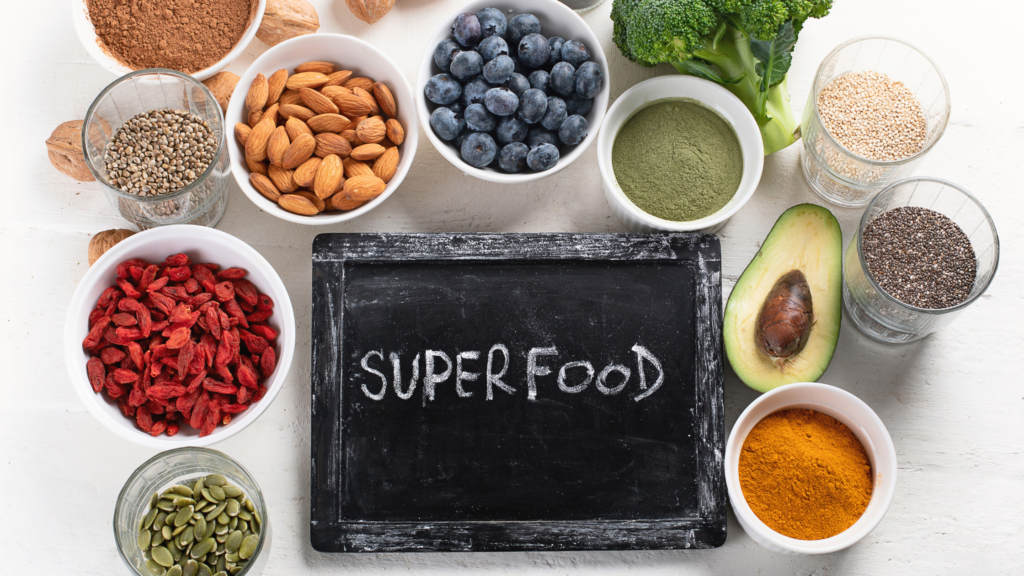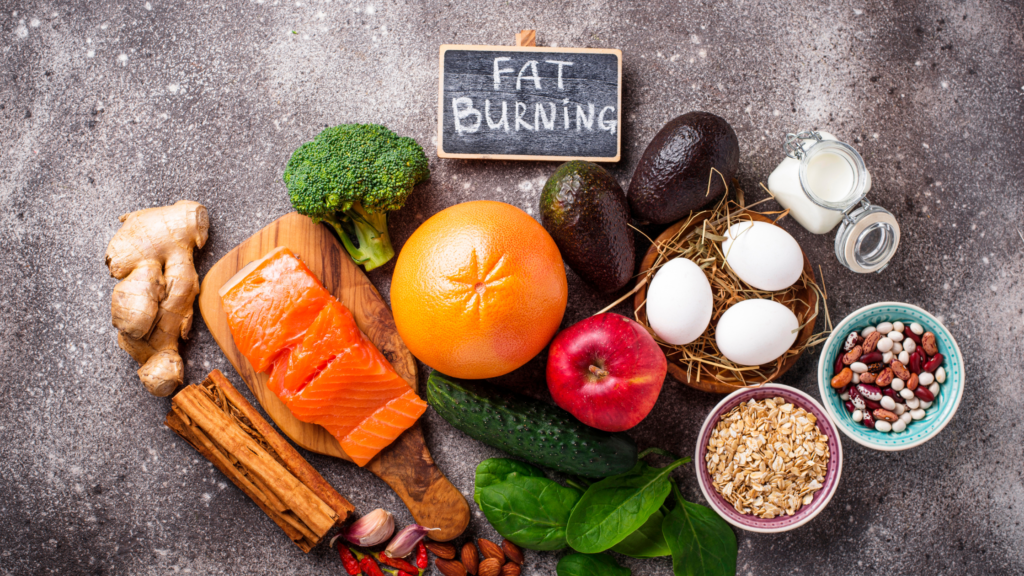Table of Contents
I. Introduction
Are you looking to trim down and revitalize your health with some strategic dietary choices? Welcome to the world of superfoods—natural game changers in the quest for weight loss and overall wellness. These aren’t just any foods; they’re categorized as “super” for their dense nutritional content and minimal caloric impact. In this guide, we’ll dive deep into the ten most effective superfoods that can help speed up your fat loss journey, explaining not only what makes them so powerful but also how you can incorporate them into your daily life seamlessly.
II. What are Superfoods?

In the realm of nutrition, “superfoods” is a term often used to describe foods that are exceptionally nutrient-dense and beneficial for one’s health. These foods go beyond merely providing calories; they are rich in vitamins, minerals, antioxidants, and other health-promoting substances that can significantly enhance one’s diet. Superfoods are not a separate food category but rather a label given to foods that can offer a powerful dose of nutrients and thus have the potential to positively impact health.
1. Nutrient Density
The key characteristic of superfoods is their high nutrient density. This means they provide a large amount of nutrients relative to their calorie content. For example, kale and spinach deliver copious amounts of vitamins A, C, K, and several B vitamins, along with minerals like magnesium and calcium, all with very few calories. This makes them ideal for enhancing diet quality without contributing excessively to calorie intake, which is crucial for managing weight and preventing obesity.
2. Antioxidant Properties
Antioxidants are compounds that help combat oxidative stress by neutralizing free radicals—unstable molecules that can cause cell damage and contribute to chronic diseases. Superfoods like berries, dark chocolate, and pecans are renowned for their rich antioxidant content. Regularly consuming these foods can strengthen your body’s defense against chronic conditions such as heart disease, diabetes, and cancer.
3. Rich in Healthy Fats
Some superfoods, such as avocados, nuts, and fatty fish like salmon, are valued for their healthy fats, including omega-3 fatty acids. These fats are essential for brain health, inflammation reduction, and overall cellular function. Omega-3 fatty acids are particularly important because they are not synthesized by the body and must be obtained through diet. Incorporating these fats regularly can help improve heart health and reduce the risk factors for heart disease.
4. High Fiber Content
Fiber is another critical component that many superfoods possess. Foods high in fiber, such as legumes, whole grains, and fruits, not only aid in digestion and prevent constipation but also help maintain a healthy weight by keeping you feeling full longer. Moreover, fiber-rich foods play a role in controlling blood sugar levels and lowering cholesterol.
5. Provision of Essential Amino Acids and Enzymes
Certain superfoods are excellent sources of essential amino acids—the building blocks of proteins that the body cannot produce on its own. Foods like quinoa and buckwheat are complete proteins, meaning they contain all nine essential amino acids, which is quite rare for plant-based foods. These are crucial for muscle repair, growth, and general body function. Additionally, some superfoods can be significant sources of enzymes, which facilitate countless biochemical reactions in the body, including digestion and energy production.
6. Overall Health Benefits
The broad range of vitamins, minerals, and other beneficial compounds in superfoods can contribute to improved health in many ways. Regular consumption can enhance immune function, reduce inflammation, support digestive health, and boost energy levels. Furthermore, because many superfoods also contain compounds that can improve mood and alleviate depression, they are also seen as beneficial for mental health.
In essence, superfoods earn their title not through any official classification but by providing concentrated amounts of essential nutrients that can support various aspects of human health. Incorporating these foods into a balanced diet can help individuals meet their nutritional needs, fight off disease, and maintain overall vitality. Thus, while no single food holds the key to good health or disease prevention, including a variety of these nutrient-packed foods in your diet can significantly contribute to a healthier life.
III. The Science Behind Superfoods and Fat Loss

To effectively incorporate superfoods into a weight loss regimen, it’s crucial to understand the science behind how these nutrient-dense foods aid in fat loss. Superfoods impact fat loss through several biological mechanisms, each contributing to the overall goal of weight reduction and improved health. By boosting metabolism, enhancing satiety, reducing inflammation, and regulating blood sugar levels, superfoods create a favorable environment for weight loss and long-term health maintenance.
1. Boosting Metabolism
One of the primary ways superfoods assist in weight loss is by enhancing metabolic functions. Metabolism refers to the biochemical processes that occur within the body, including those that break down nutrients to produce energy. Certain superfoods, such as green tea and chili peppers, contain natural compounds that increase metabolic rate—a process known as thermogenesis. For instance, the catechins in green tea can significantly boost metabolism and increase the amount of energy the body burns through. Similarly, capsaicin, found in hot peppers, has been shown to promote fat oxidation and increase energy expenditure.
2. Enhancing Satiety
Feeling full and satisfied after meals is vital for reducing overall calorie intake, and this is where superfoods play a crucial role. Foods high in protein, fiber, and healthy fats are particularly effective at promoting satiety. For example, chia seeds and avocados are loaded with fiber and healthy fats, which help slow down digestion and increase the duration of fullness after eating. Protein-rich superfoods like Greek yogurt and salmon also contribute to satiety by triggering the release of hormones that signal fullness to the brain, reducing the likelihood of overeating.
3. Reducing Inflammation
Chronic inflammation is linked to a host of health issues, including obesity and metabolic syndrome. Many superfoods have anti-inflammatory properties that not only improve overall health but also support weight loss. Foods rich in antioxidants, such as berries and dark leafy greens, can reduce the inflammatory response in the body. Omega-3 fatty acids, found in fish like salmon and in flaxseeds, are also known for their anti-inflammatory effects. By reducing inflammation, these superfoods can improve metabolic health and enhance the body’s ability to lose weight.
4. Regulating Blood Sugar Levels
Maintaining stable blood sugar levels is essential for controlling appetite and minimizing fat storage. Superfoods like cinnamon, which can be added to a variety of dishes, have the ability to moderate blood sugar levels and prevent spikes that can lead to cravings and increased fat storage. Legumes, another category of superfoods, are high in fiber and protein, which help slow the absorption of sugar during digestion, keeping blood sugar levels stable.
5. Improving Gut Health
The health of your gut plays a significant role in weight management and overall well-being. Many superfoods enhance gut health by providing prebiotics and probiotics, which are essential for maintaining a healthy gut flora. Prebiotics, found in foods like garlic and onions, feed the good bacteria in the gut, while probiotics, present in fermented foods like kefir and sauerkraut, add beneficial bacteria to the digestive system. A healthy gut flora has been linked to a lower risk of obesity and can improve metabolic health, aiding in fat loss.
6. Enhancing Nutrient Absorption
Finally, the ability of superfoods to enhance nutrient absorption can contribute to weight loss. Superfoods are often rich in certain vitamins and minerals, like vitamin C and iron, which can help improve the body’s ability to absorb nutrients effectively. For example, vitamin C enhances iron absorption, which is crucial for maintaining energy levels and proper metabolic function. Improved nutrient absorption ensures that the body receives all the necessary elements it needs for optimal performance and prevents deficiencies that can lead to overeating and weight gain.
Understanding these scientific principles provides a clear insight into how incorporating superfoods into your diet can significantly aid in fat loss and contribute to overall health improvements. By focusing on foods that enhance metabolism, satiety, and nutrient absorption, and reduce inflammation and blood sugar spikes, you can create a diet that supports sustainable weight loss and long-term health benefits.
IV. Top 10 Superfoods for Accelerating Fat Loss

Incorporating specific superfoods into your diet can significantly enhance your fat loss efforts. These foods are not only nutrient-dense but also possess unique properties that help boost metabolism, reduce appetite, and optimize bodily functions conducive to weight loss. Let’s explore the top 10 superfoods that can help accelerate your fat loss journey, delving into their benefits and how best to include them in your diet.
1. Green Tea
Benefits
Green tea is celebrated for its high antioxidant content, specifically catechins like EGCG (epigallocatechin gallate), which enhance metabolic health and support fat oxidation. The modest caffeine content in green tea also provides a natural energy boost and increases calorie burn throughout the day.
How to Incorporate
Drink a cup of green tea to start your morning or as a refreshing pick-me-up in the afternoon. You can also try cold-brewed green tea for a different flavor profile or matcha for a higher concentration of antioxidants.
2. Avocado
Benefits
Avocado is a source of healthy monounsaturated fats that help regulate blood sugar levels and fiber to keep you feeling full longer. Its fats are also unique in that they might help reduce abdominal fat, a common problem area for many.
How to Incorporate
Add avocado slices to your morning toast, blend into smoothies for a creamy texture, or dice it into salads and salsas for a nutrient boost at lunch or dinner.
3. Berries
Benefits
Berries, including blueberries, strawberries, and raspberries, are low in calories but rich in dietary fiber and antioxidants. These attributes make them excellent for weight loss as they help reduce inflammation and control hunger pangs.
How to Incorporate
Mix berries into your breakfast oatmeal, layer them in a yogurt parfait, or simply snack on them fresh or frozen. They also make a great natural sweetener in desserts and smoothies.
4. Chia Seeds
Benefits
Chia seeds are a fantastic fiber source, providing both soluble and insoluble fiber which aids in digestion and prolongs satiety. They also contain high levels of omega-3 fatty acids, which are known to combat inflammation and support metabolic health.
How to Incorporate
Sprinkle chia seeds over salads, stir into yogurt, or soak them to make chia pudding—a versatile base for various flavors and toppings.
5. Coconut Oil
Benefits
Coconut oil contains medium-chain triglycerides (MCTs), which are metabolized differently than other types of fats, leading to enhanced energy expenditure and less storage as fat. MCTs can also help increase feelings of fullness and improve the gut environment.
How to Incorporate
Use coconut oil in cooking, especially for frying or sautéing. It can also be added to coffee or smoothies for extra energy and flavor.
6. Whole Eggs
Benefits
Whole eggs are a powerhouse of nutrition, offering high-quality protein and fats that can keep you satiated. They also contain essential vitamins and minerals that support overall health and help maintain muscle mass during weight loss.
How to Incorporate
Enjoy eggs in various forms—boiled, scrambled, or poached. They work well in sandwiches, salads, or simply on their own with a sprinkle of salt and pepper.
7. Almonds
Benefits
Almonds are rich in protein, fiber, and healthy monounsaturated fats, making them an ideal snack for weight loss. They help control blood sugar levels and reduce the urge to overeat by promoting a feeling of fullness.
How to Incorporate
Snack on a handful of raw or roasted almonds, or chop them to add a nutty crunch to salads, yogurt, or oatmeal.
8. Greek Yogurt
Benefits
Greek yogurt is loaded with protein, which is vital for satiety and muscle repair. It also includes probiotics, which support digestive health—an essential factor in overall weight management.
How to Incorporate
Choose plain Greek yogurt to avoid added sugars and customize it with fruits, nuts, or a little honey for breakfast or as a healthy snack.
9. Spinach
Benefits
Spinach is extremely low in calories but high in fiber, vitamins, and minerals, including iron and magnesium, which support metabolic health and aid in energy production.
How to Incorporate
Add fresh spinach to smoothies, salads, or sandwiches for a quick nutritional boost. It can also be cooked as a side dish or added to soups and pastas.
10. Salmon
Benefits
Salmon is a top source of omega-3 fatty acids, which are crucial for reducing inflammation and supporting heart health. It’s also rich in high-quality protein, promoting muscle growth and maintenance during weight loss efforts.
How to Incorporate
Grill, bake, or pan-sear salmon as a main dish. It pairs well with a range of flavors and side dishes, making it versatile for any meal.
By incorporating these superfoods into your diet, you’re not only enhancing your body’s ability to lose fat but also improving your overall health. These foods provide a robust foundation for a nutritious diet that supports sustained weight loss and vitality.
V. Additional Lifestyle Tips for Enhancing Fat Loss
While integrating superfoods into your diet is a powerful step towards achieving fat loss, optimizing other lifestyle factors is equally important. A comprehensive approach that includes exercise, hydration, sleep, stress management, and mindful eating can significantly enhance the effectiveness of your dietary efforts. Here’s a deeper look into these lifestyle tips that can help accelerate fat loss and improve overall health.
1. Consistent Physical Activity

Exercise is indispensable in any fat loss plan. It not only burns calories but also builds muscle mass, which in turn increases your resting metabolic rate—the rate at which you burn calories when at rest. A mix of aerobic (cardio) exercises and strength training is most effective:
Aerobic Exercise: Activities like walking, running, cycling, and swimming increase your heart rate and burn a lot of calories quickly. Aim for at least 150 minutes of moderate aerobic activity or 75 minutes of vigorous activity each week.
Strength Training: Building muscle is crucial because muscle tissue burns more calories than fat tissue even when you’re not moving. Include strength training exercises, such as weightlifting or bodyweight exercises, at least twice a week.
2. Hydration

Drinking enough water is essential for anyone trying to lose weight. Water helps fill you up, making you less likely to overeat, and boosts your metabolism. Often, the body can mistake thirst for hunger, so staying well-hydrated can prevent unnecessary snacking. Aim for 8-10 glasses of water a day, and try drinking a glass of water before meals to naturally eat less.
3. Quality of Sleep

Sleep is a powerful regulator of hunger hormones, and lack of sleep is linked to an increase in appetite and a decrease in metabolic rate. When you’re sleep-deprived, your body produces more ghrelin (a hormone that signals hunger) and less leptin (a hormone that signals fullness). Adults should aim for 7-9 hours of quality sleep per night. Establish a regular sleep routine, limit caffeine and electronic device use before bed to improve sleep quality.
4. Stress Management

High stress levels can lead to overeating and weight gain, particularly in the abdominal area. This is due to the increased production of cortisol, a hormone that can promote fat storage. Managing stress through meditation, yoga, deep breathing exercises, or simply engaging in hobbies or activities you enjoy can reduce cortisol levels and support your weight loss efforts.
5. Mindful Eating
Mindful eating involves paying full attention to the experience of eating and drinking, both inside and outside the body. It helps you enjoy your food more and often leads to improved weight management. Practice eating slowly and without distraction, listen to your body’s hunger cues, and stop eating when you feel full. This practice can help you avoid overeating and make your meals more satisfying.
6. Regular Meal Timing

Eating your meals at consistent times can help regulate your body’s metabolism and avoid unnecessary snacking or binge eating. Try to eat at similar times every day and avoid late-night snacks, which can disrupt your sleep and lead to weight gain.
7. Accountability
Keeping a food diary or using a food tracking app can help you monitor what you eat, how much you exercise, and your progress over time. This accountability can keep you motivated, help you stick to your goals, and allow you to see patterns in your eating habits that you can improve.
8. Social Support
Engaging with a community that shares your health goals can provide additional motivation and support. Whether it’s friends, family, or an online community, having others to share your challenges and successes with can make your weight loss journey more enjoyable and less daunting.
By combining these additional lifestyle tips with a diet rich in superfoods, you can create a powerful synergy that enhances fat loss and promotes long-term health and wellness. Each element of this holistic approach plays a vital role in achieving the healthy body you desire.
VI. Conclusion
Arming yourself with the knowledge of what superfoods can do for your diet and overall health is the first step toward sustainable fat loss. By incorporating these foods into a balanced diet and adopting a healthy lifestyle, you set the stage for successful weight management and improved health. Remember, the goal is to make lifelong changes that fit your lifestyle, not just quick fixes.
FAQs
What defines a superfood?
Superfoods are nutritionally dense foods that are particularly beneficial for health and well-being. They offer a higher concentration of beneficial nutrients than most other foods.
Can eating superfoods alone lead to weight loss?
No, superfoods are not a magic solution for weight loss. They should be part of a balanced diet combined with regular physical activity.
How often should one eat superfoods?
Incorporate a variety of superfoods into your daily diet to ensure a wide range of nutrients. Diversity in your diet is key to receiving all the necessary vitamins and minerals.
Are there any potential risks with superfoods?
While superfoods are generally safe for most people, some may trigger allergic reactions or interact with certain medications. It’s always best to consult with a healthcare provider before making significant changes to your diet, especially if you have underlying health conditions.
How can busy individuals incorporate superfoods into their diets?
Many superfoods are easy to prepare and can be included in quick meals. Planning your meals in advance, preparing superfood-rich snacks for on-the-go, and incorporating these foods into simple dishes like smoothies, salads, and wraps can make it manageable for even the busiest individuals.
By understanding the powerful benefits of superfoods and implementing the tips provided, you are well on your way to achieving a healthier, leaner body. Remember, the path to weight loss is a journey of consistency and balance, not just a destination.

